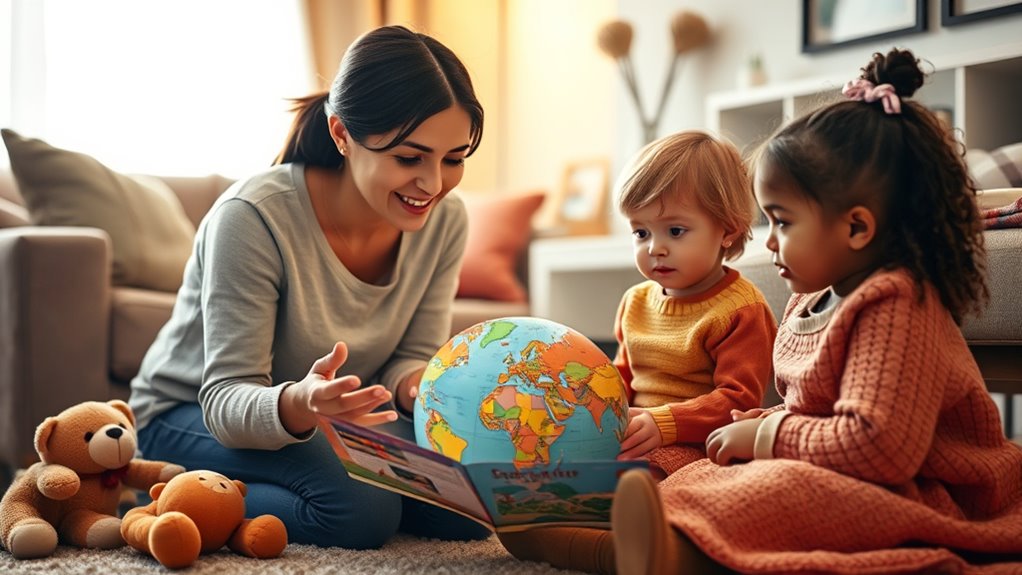When talking to kids about world news, be honest but gentle, choosing age-appropriate language to help them understand without overwhelming them. Reassure them they are safe and focus on positive efforts to improve situations, while validating their feelings. Encourage open questions and emotional expression, and model calmness yourself. Keep explanations simple, and remind them that it’s okay to feel upset. If you want to learn more effective ways to approach these conversations, there’s helpful guidance ahead.
Key Takeaways
- Use age-appropriate language and focus on facts to prevent overwhelming children with complex or frightening details.
- Encourage open questions and emotional expression to help kids process their feelings healthily.
- Highlight positive efforts and solutions to promote hope and reduce feelings of helplessness.
- Maintain a calm, steady tone to model resilience and create a sense of safety during discussions.
- Combine media literacy with emotional support to help children critically understand news and manage fears effectively.

Have you ever wondered how to discuss complex world events with your kids? Talking about troubling news can feel overwhelming, especially when you want to protect their innocence without leaving them in the dark. The key is to approach these conversations with care, fostering media literacy and emotional resilience. When you teach kids to understand how news is presented, you help them develop media literacy, which makes them more discerning consumers of information. Explain that not everything on the news is as straightforward as it seems; some stories are shaped by different perspectives or highlight only certain details. By helping your children analyze news sources critically, you empower them to see beyond sensational headlines and understand the context. This reduces fear rooted in misinformation or misunderstandings.
At the same time, nurturing emotional resilience is essential. Kids can easily feel overwhelmed or anxious when they see distressing images or hear about tragedies. Instead of shielding them completely, encourage open dialogue. Let them ask questions and express their feelings. Validate their emotions and reassure them that it’s okay to feel upset, but also remind them that they are safe. Teach coping strategies, like focusing on what they can control or taking breaks from the news when needed. Creating a safe space for discussion helps them process their feelings in a healthy way. Additionally, understanding the importance of contrast ratio in visual media can help children better interpret images and videos they encounter, making news consumption less confusing and more meaningful.
When talking about difficult news, keep your language age-appropriate and honest. Avoid sugarcoating or dismissing their worries, but don’t dwell on the worst-case scenarios either. Instead, focus on fostering understanding and hope. For example, you might say, “There are many people working hard to make things better,” which encourages a sense of agency. Remember, your tone matters. Calm, steady communication helps children feel secure and less anxious. It also models emotional resilience, showing them how to handle tough topics without panic.
Lastly, tailor the conversation to your child’s age and maturity. Younger kids may need simple explanations and reassurance, while older children can handle more nuanced discussions. Keep the lines of communication open, so they know they can come to you with questions or concerns anytime. By combining media literacy with emotional resilience, you guide your kids through complex news in a way that minimizes fear and promotes understanding and strength. This balanced approach helps them navigate the world’s challenges with confidence and resilience.
Frequently Asked Questions
How Can I Tell if My Child Is Ready to Hear World News?
You can tell if your child is ready to hear world news by observing their developmental cues and emotional readiness. If they ask questions about current events or seem curious without becoming overly upset, it’s a good sign. Watch for signs of anxiety or fear, and make sure they can handle complex topics calmly. When they seem interested and emotionally prepared, introduce news gradually, keeping explanations age-appropriate and reassuring.
What Are Signs My Child Is Feeling Overwhelmed?
You’ll notice signs your child is feeling overwhelmed through emotional cues like sudden tears or withdrawal, and behavioral changes such as difficulty sleeping or losing interest in activities. About 60% of kids show visible stress when exposed to upsetting news. Pay attention to these signs, and check in with gentle questions. If your child appears overwhelmed, offer reassurance, create a calm environment, and limit their exposure to distressing news.
How Do I Handle Difficult Questions From My Child?
When your child asks difficult questions, stay calm and offer age-appropriate explanations. Use simple language they can understand, and reassure them emotionally with supportive words. Listen carefully to their concerns, validate their feelings, and avoid overwhelming details. Providing emotional support helps them process their thoughts and fears. Remember, your calmness and honesty build trust, making it easier for your child to navigate tough topics confidently.
Should I Limit My Child’s Exposure to World News?
Think of media as a garden—you need to tend it carefully. Limiting your child’s exposure to world news isn’t about shielding them completely but about providing age-appropriate content. You help them develop media literacy by guiding their understanding and filtering out overwhelming or inappropriate stories. Keep discussions open, share facts kindly, and make certain they’re learning at a pace suited to their age, so they stay curious without feeling overwhelmed.
How Can I Encourage Empathy Without Causing Fear?
You can encourage empathy by engaging in age-appropriate conversations about world news, focusing on kindness and understanding. Use simple language to explain issues, highlighting positive actions people take to help others. Always provide emotional reassurance, letting your child know it’s okay to feel upset and that they can make a difference. By fostering compassion through gentle discussions, you help them develop empathy without causing unnecessary fear.
Conclusion
Remember, talking to kids about world news is like planting seeds in their curious minds. By sharing honest, age-appropriate information without fear, you help them grow into compassionate and aware individuals. Think of yourself as a gentle lighthouse—guiding them safely through the stormy seas of information. With patience and understanding, you can turn difficult conversations into opportunities for trust and learning, lighting the way for their bright, hopeful future.









